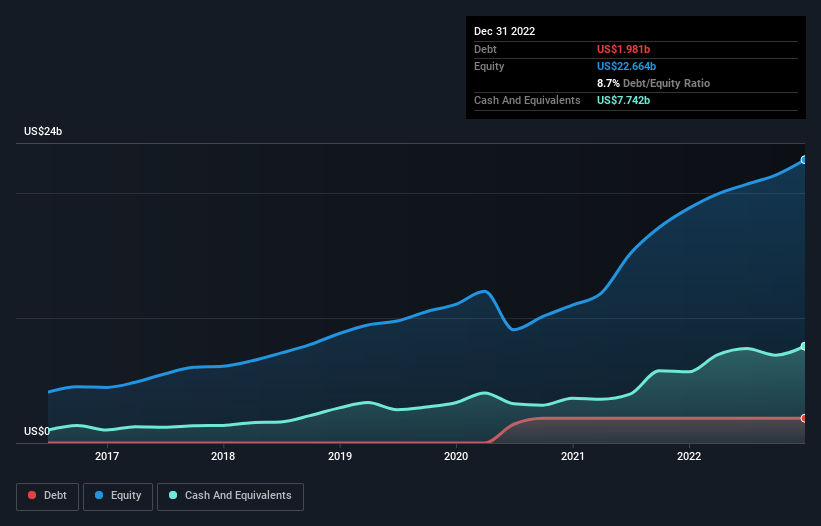Does Regeneron Pharmaceuticals (NASDAQ:REGN) Have A Healthy Balance Sheet?
Some say volatility, rather than debt, is the best way to think about risk as an investor, but Warren Buffett famously said that 'Volatility is far from synonymous with risk.' So it might be obvious that you need to consider debt, when you think about how risky any given stock is, because too much debt can sink a company. As with many other companies Regeneron Pharmaceuticals, Inc. (NASDAQ:REGN) makes use of debt. But the real question is whether this debt is making the company risky.
When Is Debt A Problem?
Debt and other liabilities become risky for a business when it cannot easily fulfill those obligations, either with free cash flow or by raising capital at an attractive price. Ultimately, if the company can't fulfill its legal obligations to repay debt, shareholders could walk away with nothing. However, a more common (but still painful) scenario is that it has to raise new equity capital at a low price, thus permanently diluting shareholders. Of course, plenty of companies use debt to fund growth, without any negative consequences. When we think about a company's use of debt, we first look at cash and debt together.
View our latest analysis for Regeneron Pharmaceuticals
What Is Regeneron Pharmaceuticals's Net Debt?
As you can see below, Regeneron Pharmaceuticals had US$1.98b of debt, at December 2022, which is about the same as the year before. You can click the chart for greater detail. However, it does have US$7.74b in cash offsetting this, leading to net cash of US$5.76b.
A Look At Regeneron Pharmaceuticals' Liabilities
The latest balance sheet data shows that Regeneron Pharmaceuticals had liabilities of US$3.14b due within a year, and liabilities of US$3.41b falling due after that. Offsetting this, it had US$7.74b in cash and US$5.33b in receivables that were due within 12 months. So it can boast US$6.52b more liquid assets than total liabilities.
This surplus suggests that Regeneron Pharmaceuticals has a conservative balance sheet, and could probably eliminate its debt without much difficulty. Succinctly put, Regeneron Pharmaceuticals boasts net cash, so it's fair to say it does not have a heavy debt load!
In fact Regeneron Pharmaceuticals's saving grace is its low debt levels, because its EBIT has tanked 44% in the last twelve months. When it comes to paying off debt, falling earnings are no more useful than sugary sodas are for your health. There's no doubt that we learn most about debt from the balance sheet. But ultimately the future profitability of the business will decide if Regeneron Pharmaceuticals can strengthen its balance sheet over time. So if you want to see what the professionals think, you might find this free report on analyst profit forecasts to be interesting.
But our final consideration is also important, because a company cannot pay debt with paper profits; it needs cold hard cash. While Regeneron Pharmaceuticals has net cash on its balance sheet, it's still worth taking a look at its ability to convert earnings before interest and tax (EBIT) to free cash flow, to help us understand how quickly it is building (or eroding) that cash balance. During the last three years, Regeneron Pharmaceuticals produced sturdy free cash flow equating to 68% of its EBIT, about what we'd expect. This free cash flow puts the company in a good position to pay down debt, when appropriate.
Summing Up
While we empathize with investors who find debt concerning, you should keep in mind that Regeneron Pharmaceuticals has net cash of US$5.76b, as well as more liquid assets than liabilities. And it impressed us with free cash flow of US$3.4b, being 68% of its EBIT. So we are not troubled with Regeneron Pharmaceuticals's debt use. Of course, we wouldn't say no to the extra confidence that we'd gain if we knew that Regeneron Pharmaceuticals insiders have been buying shares: if you're on the same wavelength, you can find out if insiders are buying by clicking this link.
At the end of the day, it's often better to focus on companies that are free from net debt. You can access our special list of such companies (all with a track record of profit growth). It's free.
Have feedback on this article? Concerned about the content? Get in touch with us directly. Alternatively, email editorial-team (at) simplywallst.com.
This article by Simply Wall St is general in nature. We provide commentary based on historical data and analyst forecasts only using an unbiased methodology and our articles are not intended to be financial advice. It does not constitute a recommendation to buy or sell any stock, and does not take account of your objectives, or your financial situation. We aim to bring you long-term focused analysis driven by fundamental data. Note that our analysis may not factor in the latest price-sensitive company announcements or qualitative material. Simply Wall St has no position in any stocks mentioned.
Join A Paid User Research Session
You’ll receive a US$30 Amazon Gift card for 1 hour of your time while helping us build better investing tools for the individual investors like yourself. Sign up here

 Yahoo Finance
Yahoo Finance 
